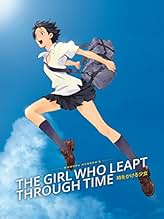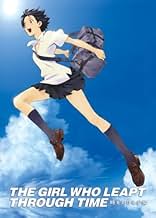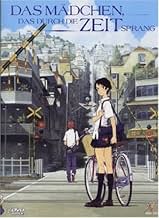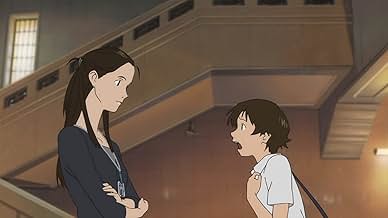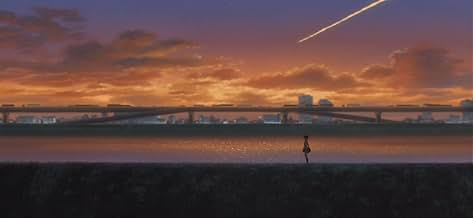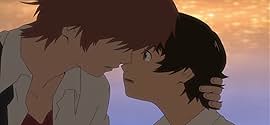अपनी भाषा में प्लॉट जोड़ेंA high-school girl named Makoto acquires the power to travel back in time, and decides to use it for her own personal benefits. Little does she know that she is affecting the lives of others... सभी पढ़ेंA high-school girl named Makoto acquires the power to travel back in time, and decides to use it for her own personal benefits. Little does she know that she is affecting the lives of others just as much as she is her own.A high-school girl named Makoto acquires the power to travel back in time, and decides to use it for her own personal benefits. Little does she know that she is affecting the lives of others just as much as she is her own.
- पुरस्कार
- 12 जीत और कुल 2 नामांकन
- Makoto Konno
- (वॉइस)
- Miyuki Konno
- (वॉइस)
- Obasan
- (वॉइस)
- Kato
- (वॉइस)
- School Nurse
- (वॉइस)
- …
कहानी
क्या आपको पता है
- ट्रिवियाThis movie is an indirect adaptation of Yasutaka Tsutsui's novel "The Girl Who Leapt Through Time" - the main character's aunt is Yoshiyama Kazuko, the protagonist of the novel.
- गूफ़Spoiler: During the time-stop sequence Chiaki laments that he will not be able to see the painting he has come to the past for because it is in restoration and he will not be around the next day when it is put on the wall. But Makoto knows that the picture is worked on by her aunt and so they could just go upstairs and take a look at it (they may find the door locked but the possibility is not even mentioned). Chiaki's last jump could not have erased that memory because Makoto's knowledge predates the event.
- भाव
Yuri Hayakawa: [Makoto Leaves the room, then Yuri watches the Blackboard] Makoto: Time waits for no one
- कनेक्शनFeatured in Glass Reflection: The Girl Who Leapt Through Time (2010)
"The Girl Who Leapt Through Time" is based on a 1967 hit novel of the same title. The original work has been used in numerous film and dorama adaptations, most famous ones being the 1983 film directed by Oobayashi Nobuhiko. Instead of making just another anime adaptation and possibly becoming just another adaptation shadowed by the 1983 film, the producers took a risk by creating a spin-off movie with the setting of about 20 years after the original story. The gamble paid off big time, as the animated film went on to win at least 23 awards worldwide.
The underlying theme in this movie was "the importance of living the moment". Our protagonist was given the power to leap back into time to correct her mistakes, only to realize later that the short-term gains only lead to greater losses that followed. The story was extremely well-constructed to teach the lesson of embracing things the way they are, and never run from confrontations, because once that moment gone, you'll never get it back.
The director for this film did a phenomenal job of pacing and creating many memorable moments, but it was the live-action film screenwriter Okudera Satoko, who really made a difference for this movie by composing a story out of number of time leaps that slowly developed the main characters and made so many epic scenes possible. Many anime screenwriters fail in movies because they incorporate too many characters, as it is common practice in series, into the limited 100 minute time-frame. What's remarkable about this piece of work is that it focuses on only three main characters. Even counting the secondary cast, there are only 8 characters in total who we are given the names of. The limited number of characters not only improved character development, it also allowed the story to focus on the underlying theme.
I was actually very uncertain about the viewing this year because I started watching a lot of TV anime again since the last viewing. However, the only new flaws I've noticed was the excessive still motion in some scenes and most backgrounds, and that the protagonist was being a bit overly insensitive in few instances, which made her character a bit unrealistic. Animation is years ahead of its time, and it still is an excellent example of what happens when music is in harmony with the story/animation. The insert song by Oku Hanako, IMO, is still the best selection ever made among hundreds of Japanese films, anime, and live-action doramas I've encountered. Ending theme is a truly poignant one that really captured the mood and made the story sink in, and the music score throughout the movie has been used perfectly to enhance the drama.
"The Girl Who Leapt Through Time" is a timeless masterpiece that made me want to cherish every moment, and it's a movie I expect myself to be re-watching for many more years to come.
टॉप पसंद
विवरण
बॉक्स ऑफ़िस
- दुनिया भर में सकल
- $14,21,529
- चलने की अवधि1 घंटा 38 मिनट
- रंग
- ध्वनि मिश्रण
- पक्ष अनुपात
- 1.85 : 1
इस पेज में योगदान दें



